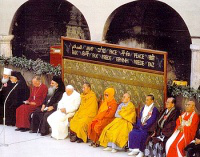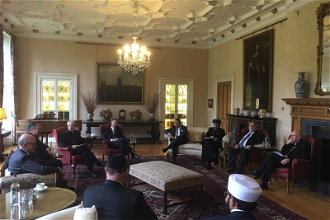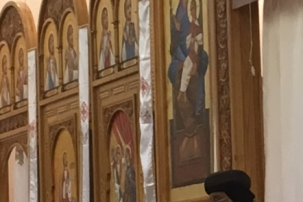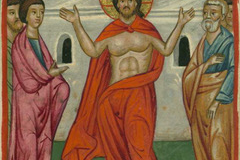Archbishop McDonald welcomes forthcoming World Day of Prayer for Peace in Assisi

Pope John Paul II with faith leaders at first Assisi gathering in 1986
Archbishop Kevin McDonald has welcomed the forthcoming World Day of Prayer for Peace which takes place in Assisi on Tuesday, 20th September 2016.
Archbishop McDonald said: "This World Day of Prayer for Peace is taking place thirty years after the first World Day of Prayer for Peace convened by Pope Saint John Paul II on 27th of October 1986. Pope John Paul's initiative in gathering together other Christian leaders and leaders of other religions was without precedent. It was inspired by the world's need for peace - a need that has only become more urgent and more pressing with the passage of time. But as we keep this anniversary it is important that we see it in context. It was not an isolated goodwill gesture; it must be understood as a key moment in the development and profile of the Papal office and of the Church in the world. It must also be seen against the background of the rich catechesis on the
relationship between Christianity and other religions which was so central to Pope John Paul's legacy to the Church.
Only the Pope could have convened a meeting of this kind. Pope John Paul was the first truly "global" Pope and his concern and sense of responsibility extended well beyond the bounds of the Catholic Church. He convened this meeting because he knew that it fell to him to do so. In his great encyclical Ut Unum Sint ("That they may be one") he acknowledged this new responsibility and also the need to discern how to exercise his primacy a way that "is open to a new situation." This is a discernment that is still very much work-in-progress but Pope Francis is clearly exercising it. He is inviting the Ecumenical Patriarch, the Archbishop of Canterbury as well as Jewish, Muslim and Buddhist leaders to witness to Peace together in Assisi.
The first World Day of Prayer must also be understood and interpreted in relation to the great body of teaching that Pope John Paul left us. In that teaching he developed the ecclesiological teaching of the Vatican II's Constitution on the Church, Lumen Gentium, ("Light of the Nations") as it relates to other religions and also the Council's Declaration on Non-Christian Religions, Nostra Aetate ("In our Time") which further elucidated the teaching of Lumen Gentium.
Central to this catechesis is his teaching on the Jews and especially his affirmation of the continuing validity of God's covenant with the Chosen People. More broadly in Chapter 10 of Redemptoris Missio ("The Mission of the Redeemer") the Pope affirms that for people who grow up in other religions "salvation in Christ is accessible by virtue of a grace which while having a mysterious relationship to the Church does not make them formally part of the Church but enlightens them in a way which is accommodated to their spiritual and material situation. This grace comes from Christ; it is the result of his Sacrifice and is communicated by the Holy Spirit." In his Christmas address to the Roman Curia given two months after the 1986 World Day of Prayer Pope John Paul II took the opportunity to give one of his most remarkable addresses on other religions. In particular he stressed the "profound unity of those who seek in religion spiritual and transcendent values."
So this commemoration is not just about recalling something that happened thirty years ago. It is about claiming and exploring the role and profile of the Church as it has developed and continues to develop in a world marked by suffering and war but in which human beings continue to hope and believe despite the terrible sufferings that many have to endure. The Holy See has recently invited episcopal conferences to join the Holy Father in Prayer for Peace by organising events to mark this occasion. While it may not be possible at this stage to organise an event on 20th September, it could also be marked on 27th October, the anniversary of the first Day of Prayer; or indeed at any convenient time or occasion. What is important is that Prayer for Peace is and should be part of the life of the Church and organised in whatever way is best suited to the circumstances and resources of each local Church.
Archbishop McDonald is responsible for Catholic-Jewish relations and Interreligious Relations for the Catholic Bishops' Conference of England & Wales.





















